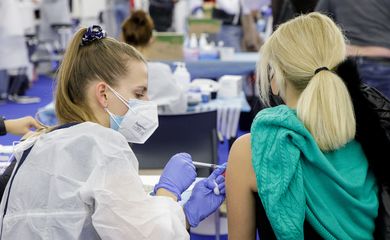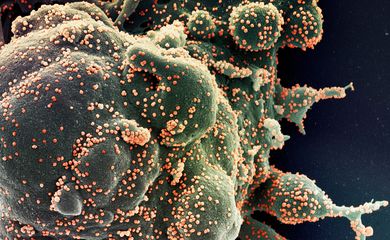Antibodies from previous infection do not prevent Ômicron disease

Antibodies resulting from a first covid-19 infection do not prevent a person from contracting again the disease with the Ômicron variant, said today (2) researcher Anne von Gottber, at the weekly virtual press conference of the office of the World Health Organization (WHO). ) in Africa.

"We believe that previous infection does not protect against Ômicron," said Anne, an infectious disease specialist at the National Institute of Communicable Diseases in South Africa.
There are still many unknowns about this new form of coronavirus, announced last week, which has 32 mutations, including its potential to spread and its resistance to vaccines.
The investigation is just beginning, but initial observations suggest that people previously infected may have fallen victim to the mutated form of the virus, often with less severe symptoms, she said.
The variant, present so far in at least 22 countries - according to the WHO - was initially detected in South Africa and Botswana and reported in two more African countries - Ghana and Nigeria.
The number of official covid-19 cases on the continent has increased by 54% in the last seven days to 30 November compared to the same period before, due to the exponential increase in infections in South Africa. cases within the next 24 hours, according to WHO Africa.
The number of cases of infection declined in all other subregions.
15 days ago, South Africa registered about 300 cases a day. On Wednesday (1), the country reported 8,561 new cases, against 4,373 the day before.
At this stage, "we don't know where the variant comes from," said WHO expert Ambrose Talisuna.
After the announcement of detection of the new variant B.1.1.529 last week, called Ômicron, South Africa and all of the neighboring countries of southern Africa were subject to travel bans by many nations.
WHO today reiterated its call to lift the restrictions, which it considers "unfair" and without any scientific justification.
"The detection and communication of the new variant by Botswana and South Africa has mobilized the world. We have a window of opportunity, but we have to act quickly and increase detection and prevention measures," said Matshidiso Moeti, regional director of WHO for Africa, cited in a statement from the organization, released after the press conference.
"Countries must adjust their response to covid-19 and prevent an outbreak of cases from spreading across Africa and eventually overburdening already-saturated health facilities," he added.
South Africa and Botswana account for 62% of cases of Ômicron infection, reporting 172 and 19 cases, respectively.
The new variant has a high number of mutations (32) in its spike protein, and preliminary laboratory tests suggest a risk of reinfection when compared to other worrying variants.
Scientists in South Africa and the region "are intensifying research to understand the transmissibility, severity and impact of Ômicron in relation to available vaccines, diagnoses and treatments and whether it is responsible for the latest outbreak of covid-19 infections," adds the communiqué from WHO Africa.
Regarding the disease data in the southern African region, which registers an outbreak, South Africa is the main responsible for this new upward curve of infections, having reported a 311% increase in new cases in the seven days prior to November 30 , compared to the same period before.
Infection cases in Gauteng, the country's most populous province, increased by 375% from one week to the next. Hospital admissions increased by 4.2% in the last seven days compared to the previous seven days. And covid-19-related deaths in the province jumped 28.6%, also compared to the previous seven days.
WHO sent an emergency team to Gauteng Province to support surveillance measures, contact tracing, infection prevention and treatment.
Botswana is increasing the production and delivery of oxygen, essential for the treatment of critically ill patients.
Other epidemiologists and laboratory experts were also mobilized to drive genetic sequencing of samples in Botswana, Mozambique and Namibia.
WHO mobilized US$12 million to support critical response activities in countries across the region over the next three months.
Text translated using artificial intelligence.




